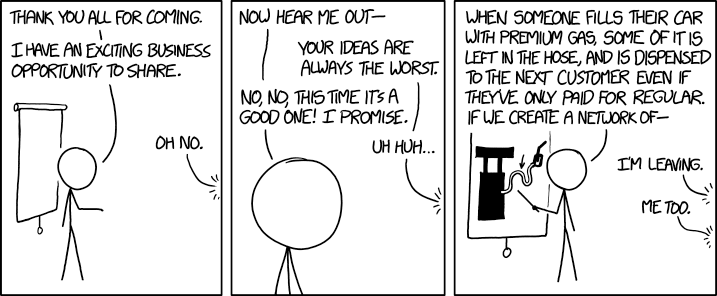What makes 3 letter domain names valuable?
- Demand - lots of company acronyms are 3 letters eg. IBM, BBC, ATT. (Fun Fact: 35 of the first 100 .com domain names registered were 3 letters long)
- Scarcity - Only 17,576 combinations.
- Tokenization/Liquidity - The domainer market has tracked values and created a minimum price
Why is interesting?
Three Letter .com prices could be a proxy for the overall secondary market for domain names.
That is a hypothesis and if anyone wants to help test that with data (monthly average sale price,
monthly sales total, something else?) please feel free to contact me / comment.
Three letter prices are the most well tracked and easiest to compare over a long period of time (thanks 3character.com!)
What is the goal of this post?
There is no goal, it is simply exploratory. I had no idea what I would find when I looked at the data,
but a lot of things jump out at me when looking at the graphs and statistics.
3 Letter Price Timeseries (All Extensions)

The first thing that stands out is .COM is huge compared to the rest. You also notice the huge crash after
July 2008. It dropped $1650 in one month. (The data is actually incorrect from 3character, the
declined started at least at the end of June 2008 and perhaps was steeper, QZB.com sold for 5550 on July 17, 2008,
3character didn't go below that until September).
Why did that happen? I am not certain, but my guess is a combination of bubble bursting and PPC profits declining.
Any other theories please comment.
3 Letter Timeseries (NO .COM)

.NET declines at the same time as .COM and starts to rebound at the same time.
For some reason it then crashes again in early 2010 and completely diverges from .COM.
.ORG and .MOBI also follow similar declines as .COM/.NET.
.BIZ and .INFO are on a slow decline but you wouldn't even realize the other TLDs crashed just looking at those two.
They seem unaffected by market crashing for everything else.
.US actually rises slightly when everything else is going down.
3 Letter Timeseries (NO .COM/.NET/.ORG)

Closer view of the lesser TLDs. Nothing really new, you do realize .MOBI never recovers from the crash.
They sit at reg fee currently.
.MOBI looks like a case study in hype and pump+dump. It soars far above more established TLDs and crashes
to worthlessness. I wish I had older timeseries data for other TLD launches and some sort of price index.
It would be fascinating to graph them all starting from launch.
If anyone has some data that would fit this contact me / post in comments.
3 Letter Timeseries + DJIA

I threw in the Dow Jones Industrial Average for fun. What does the domain market look like compared to the stock market?
It seems a similar crash but they don't happen at the same time. Perhaps domain investors aren't that connected
to the stock market? Did the money exit the stock market and go into domains for safety?
Either way, DJIA and 3 letter domains bottom out around the same time. Domains were slower to decline, but started
recovering at the same point.
Log 3 Letter Timeseries + DJIA

Everything at logarithmic scale so you can see DJIA all the way down to .BIZ and .MOBI. No new information,
just a visualization of everything at once at relative scale.
3 Letter Timeseries .COM, DJIA, Home Prices (time shifted to match peak with .com)

This one was just for fun, what does the DJIA, .COM and Median Housing Price look like together.
I shifted the peak of housing bubble to match the peak of .COM. It was to look at the shape of the curves.
I think more could be done, but there is a striking resemblance of bubble bursting. Housing price data came
from here. It's in quarters, not months. Again, this was for SHAPE ONLY.
Interesting Facts:
.COM and .NET prices have an adjusted R^2 of .513 (they seem to diverge mid 2007)
The adjusted R^2 if we cut off at mid 2007, is .967! They are almost perfectly correlated Pre-June 2007
Graph: log .COM prices with adjusted (matched starting points) log .NET prices.

Why do .COM and .NET prices stop correlating mid 2007?
By early 2010, they are going opposite directions in terms of value.
Do we have a 'loser' TLD in the making (demand dropping because of hype/artificial value)?
Is it a market correction that will level off at some point and correlate again?
Massive dumping pushing prices down?
.NET lacks a clear brand/purpose unlike .COM and .ORG?
Any other explanations?
Future Values?
The biggest question is what will the shape of these curves be in the long run?
.COM looks like it's on the rise again, but at a much less steep and not always upwards curve.
.NET is declining, hard to predict if it's temporary or long term, a lot of vested interests in the TLD, if it is dying, it will be a VERY slow decline.
.ORG is on a VERY slow rise again, I suspect this is because .ORG has a clear brand which .NET lack.
.INFO looks to be dying a slow death.
.BIZ looks to be dying a slow death.
.US is odd, it declines and goes up, but it's at such a small scale.
It's currently moving up, but it's so slight that I wouldn't expect it to hold indefinitely unless demand is increased in the US.
.MOBI looks dead.
What are your thoughts?




















